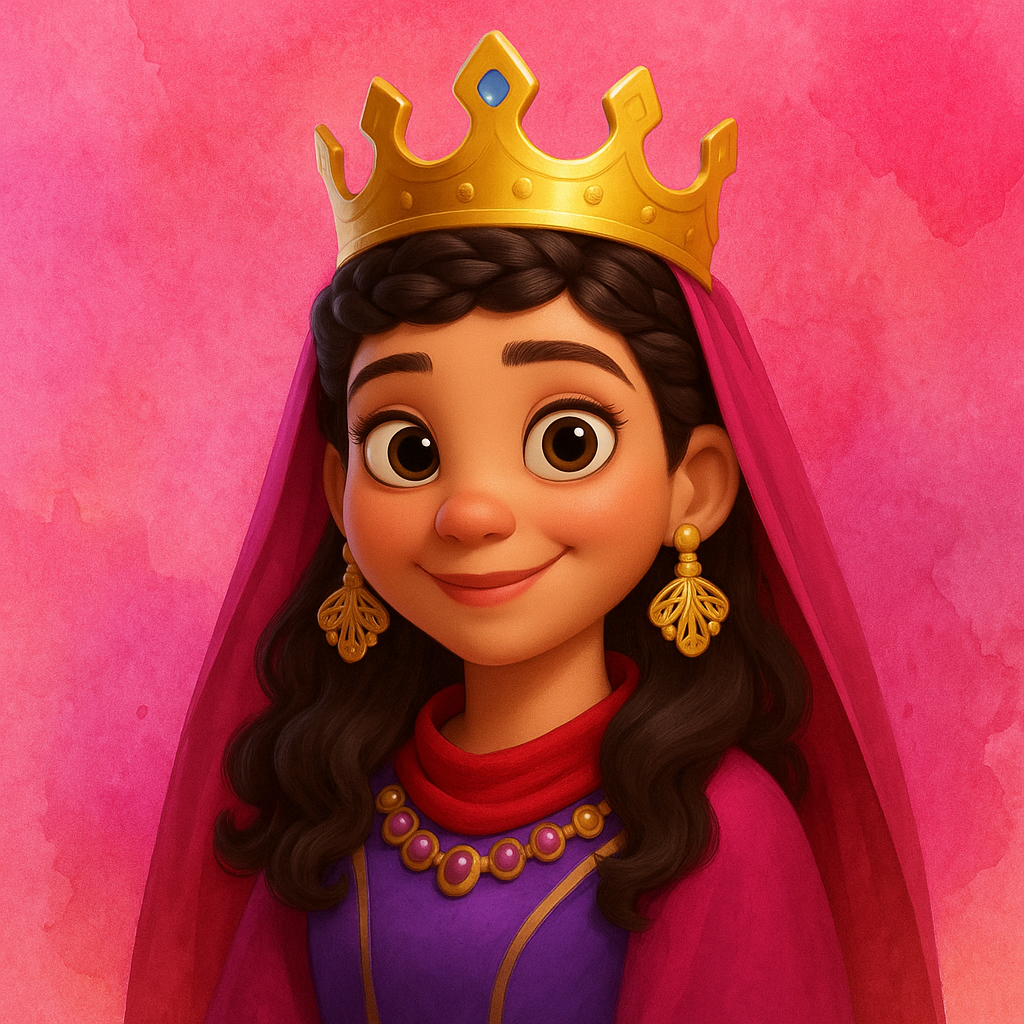Before I became Esther, I was Hadassah.
Yes, Hadassah—a small, fragrant myrtle tree, a symbol of righteousness and peace, resilient and steady, but hardly the kind that grows to touch the sky. I thought my life would be just that: rooted, quiet, ordinary.
I was a child of simple beginnings, born into a small Jewish family in Susa. My parents named me Hadassah—a name spoken with love by them and whispered in prayers by my cousin Mordecai.
My earliest memories are hazy but warm. My father’s hands were calloused from labor, yet they were gentle when he scooped me up to tell me stories of our people. My mother’s hands, gentle and firm, weaving strands of my hair as she hummed a melody I can still hear in my dreams.
His voice was deep and steady, while he told me stories of the God of Abraham, of Joseph’s rise to power in a foreign land, of Moses leading our people through parted seas, of Ruth, of the God who delivered us time and time again. My mother’s voice was a melody, her lullabies a thread that tied my restless heart to peace.
I’d like to think they saw something in me, even as an infant, that would one day blossom into something more. But those memories are fleeting, like sunlight slipping through cracks in a wall. The fever that took them came quickly, leaving our home silent and me alone. When they were gone, it was as though a door had closed on that part of my life forever.
It was Mordecai who saved me from that silence. My cousin—no, my father now—took me into his home. I can still remember the first time I looked up into his kind eyes, wet with tears he tried to hide. He was younger then, with less gray in his beard and more fire in his eyes.
He called me “Hadassah” with such tenderness that I began to believe I could still belong somewhere. He treated me as his own, though he bore the weight of his own losses. Mordecai never spoke much about his grief, but sometimes, in the quiet of the night, I would see him staring into the distance, his lips moving in silent prayer.
Ordinary Dreams of Hadassah
Growing up in Mordecai’s home, I would dream of a life as simple as the myrtle tree I was named for—a life rooted in the familiar soil of our faith and traditions. I imagined myself one day marrying a kind and steady man from our community, someone who would recite the Torah with reverence and make me laugh on quiet evenings.
I dreamed of raising children who would run barefoot through the courtyard, their laughter echoing against the stone walls. I would teach them the psalms my mother had hummed, the stories my father had told. I would pass on the warmth of my parents’ love, like a torch in the darkness.
I dreamed of tending a small garden where herbs and flowers would grow side by side. I imagined the scent of rosemary mingling with jasmine, the way my fingers would sink into the earth as I planted each seed. It was a quiet life I longed for—a life where I could be Hadassah, nothing more and nothing less.
But even then, deep in my heart, I knew the world seldom allowed such dreams to take root.
Life in Susa
We lived in the Jewish quarter of Susa, surrounded by others who, like us, were exiles in a foreign land. Life was not easy, but it was ours. Mordecai worked diligently at the city gates, and though his days were long, he always found time to teach me the ways of our faith.
In his house, I learned what it meant to be a Jew in Persia. We were a people of exiles, scattered like seeds on foreign soil, holding tightly to the laws and traditions that reminded us of who we were. Mordecai would tell me, “We may live in their land, but our hearts belong to the God of Israel.”
Life in Susa was not easy. The streets were filled with the clamor of merchants and the scent of spices, but for people like us, there was always a shadow—a reminder that we were tolerated, not embraced. I grew up knowing when to bow my head and when to keep silent. But Mordecai taught me pride as well. He taught me to value our faith, to trust that God had not forgotten us, even here.
“Never forget who you are,” he would say, his voice steady with conviction. “We are the children of Abraham, chosen by the Most High. Even in exile, we are His.”
It was a lesson he repeated often, especially as I grew older. Growing up I was not like the other girls in our neighborhood, content with the initial small dreams of marriage and family. There was a restlessness in me, a yearning I couldn’t explain. Mordecai saw it too, though he never discouraged it. Instead, he nurtured my curiosity, teaching me to read and recite the scriptures.
But as much as I tried to embrace the life we had, there was always a shadow of loss that followed me. I missed my parents—missed the way my father’s laughter filled a room, the way my mother’s hands braided my hair with care. I missed the feeling of being whole, of belonging entirely to a family.
Turn of Events
I was sixteen when I first realized how much my life would be shaped by forces beyond my control. The king’s messengers came, their voices echoing through the streets as they announced the royal decree: the young women of the kingdom were to be brought to the palace. Brought—a word that carried the weight of being taken, of having no choice.
The whispers in the marketplace began almost immediately. Mothers clutched their daughters. Fathers argued in hushed tones. And I stood frozen, clutching the edge of my shawl as if it could shield me from the world.
My steps felt heavy as I made my way back home. The streets seemed quieter now, or perhaps it was just my own heart drowning out the noise around me. When I reached home, I found Mordecai seated by the door, his usual spot for pondering the day’s happenings.
He looked up as I approached, his face immediately softening. “What is it, Hadassah?” he asked.
I sat beside him, the words spilling from my lips in a rush. The king’s command, the forced search for maidens, the court that would strip young women of their futures—it all came tumbling out. Mordecai listened in silence, his jaw tightening as I spoke.
“The king’s edicts are absolute,” he said finally, his voice heavy. “But perhaps… perhaps we must trust that the Lord’s hand is in this.”
I stared at him, searching his eyes for reassurance. But even Mordecai, the pillar of strength in my life, seemed uncertain.
I wanted to argue, to demand answers. Why did God allow our people to live as strangers in a foreign land? Why did He take my parents? Why did He let a king’s whim dictate the lives of so many? But Mordecai’s silent faith held me like an anchor in a storm, and I swallowed my questions.
I went to bed that night with a restless heart, knowing life as I knew it would soon change forever. That was the night I began to feel the shift, the faint tremor beneath my feet that told me nothing would ever be the same.
I didn’t know then what the future would hold. I didn’t know I would leave the name Hadassah behind, that I would wear the crown of a queen and carry the weight of a people’s survival on my shoulders. But I knew this: the ordinary life I had dreamed of was slipping away.
And so, I prayed. I prayed to the God of my forefathers, the God who seemed so distant yet so near. I prayed for strength, for wisdom, for a reason to hope.
Because I was Hadassah. And soon, I would have to become someone else.
Esther 2: 1-14

